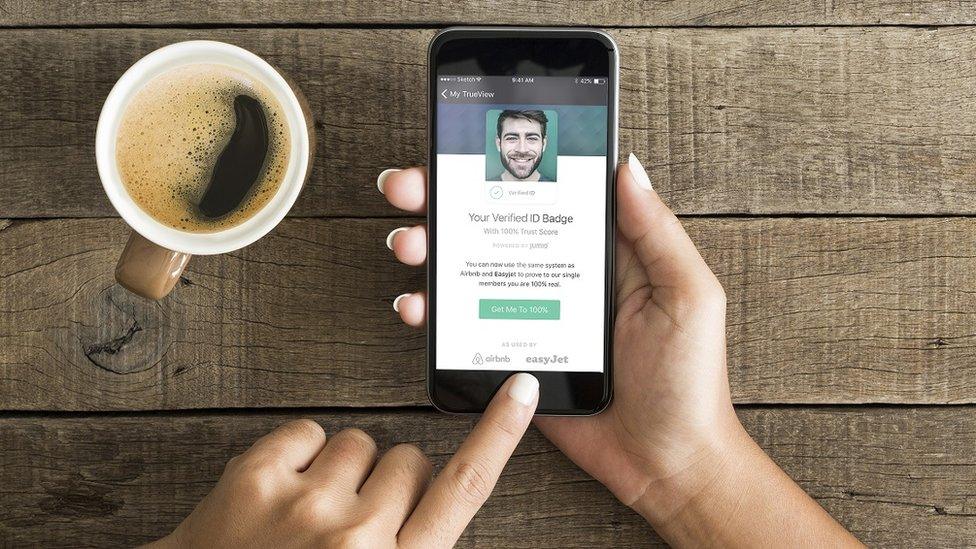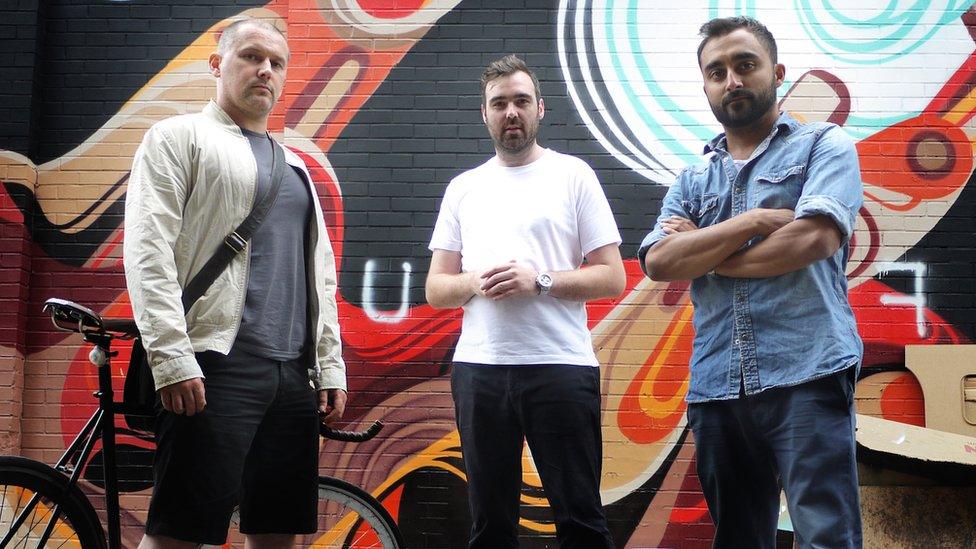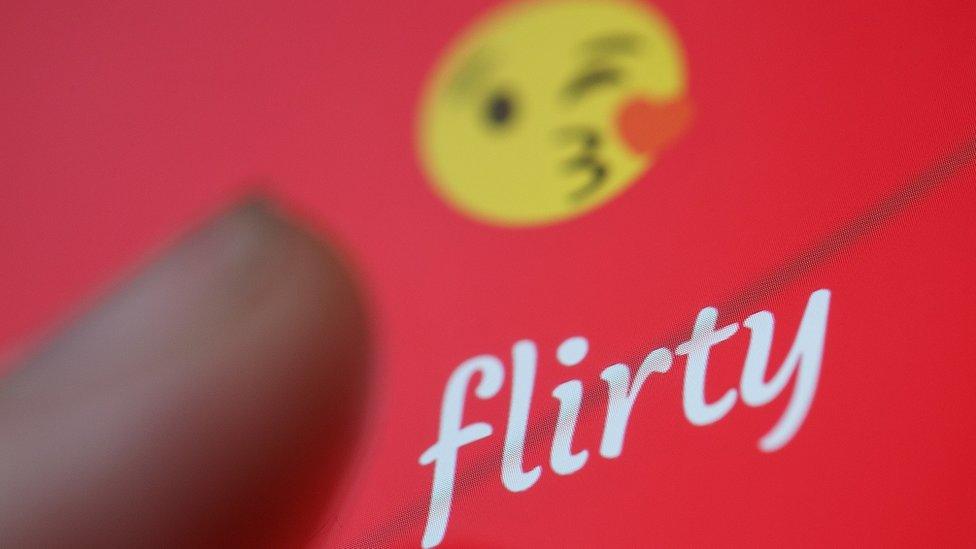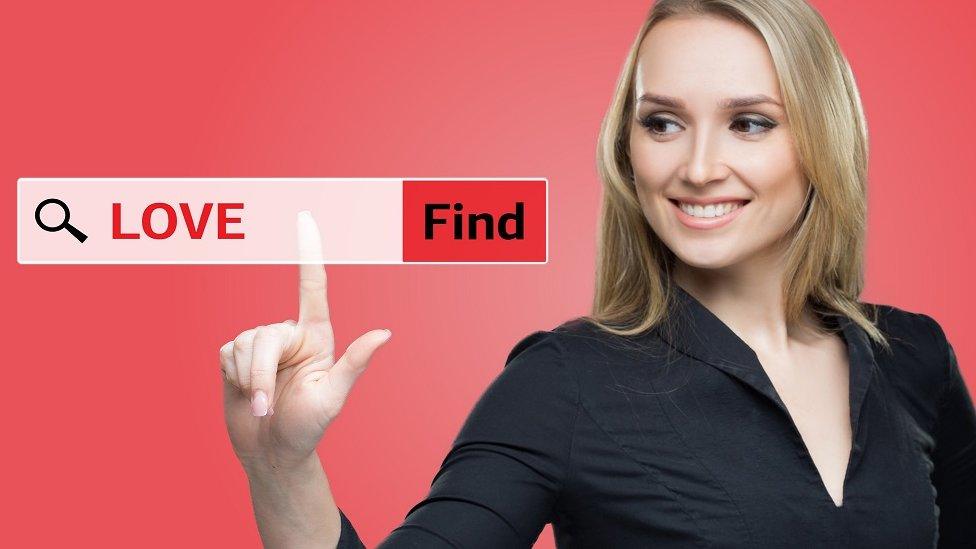What are online dating sites doing to keep us safe?
- Published

Do you know who you're really flirting with online?
It's a Friday night and I'm about to meet a hot date I hooked up with on a dating app.
But how do I know he's really who he says he is?
After all, online dating fraud is on the rise and it seems easy for people to adopt false identities, stealing photos from other websites and concocting plausible back stories.
Luckily, my date seemed legit, but if I'd been concerned I could have used a service like Circle 6.
You can let six of your closest friends know where you are at all times, and with just one tap you can contact them should you feel in danger while out on a date.
Online dating is a big and growing business - dating apps are worth $2.5bn (£2bn) in the US alone, according to Marketdata Enterprises.

TrueView members have to build up a trust verification score
New stats from campaign Get Safe Online reveal that seven reports of dating fraud are received by the UK's Action Fraud every day - an increase of 32% over two years.
So what are these companies doing to keep their members safe?
A few of the smaller apps are using technology such as Jumio, a digital identification service, to filter out scammers. Dating app TrueView, for example, uses it and has adopted a trust score verification system.
"We didn't want to create just another dating app, there are tonnes of those," says co-founder Matt Verity.
"We wanted to create one where people felt confident about who they're talking to. The more social media accounts you link to it, the more your trust score goes up," says Mr Verity.

TrueView founders (l-r) Damian Mitchell, Andrew Ibbotson and Matt Verity
But social media accounts can be bogus, too, and set up in a matter of minutes, so as well as using Jumio to delve into these accounts, they adopt another layer of identification.
"An added level of this trust score is getting users to scan in driving licences and passports - allowing you to verify who you say you are," says Mr Verity.
"The more your trust score goes up, the more trustworthy you'll look on the site."
Users can then choose to filter out anyone who doesn't have the same level of trust verification as themselves. But, he insists, anyone with a very low level trust score for a long period would be looked into further.
Yoti may be useful to check out the credentials of someone you're interested in dating.
The app gives anyone the ability to check the name, photo and age of people they meet online.
Once you've made contact with someone you can simply send them a text via the app, asking them to verify themselves using a selfie, mobile number and ID, such as a passport.

VieLoco boss Nora Lee Notzon says live video is a good way to spot fakers
A handful of other small dating sites and apps - Mai Tai for example - use similar verification systems. But VieLoco believes video is also a useful tool.
"Live video chat is the best way to discover if someone doesn't look like their photos or behaves how you might expect them to, which may be a sign that you should proceed with caution," says co-founder Nora Lee Notzon.
But what are the bigger dating companies doing to ensure our safety?
Many issue guidelines, such as never to give out personal information and to watch out for odd language in messages or personal profiles, for example.
Many insist they apply security measures, but won't reveal what systems they use.
A spokesman for Match.com told the BBC: "We have a dedicated team who monitor security on the site, through both up-to-date technology and human checks.
"But, like many companies, we do not disclose details of our security and fraud prevention tools as this provides valuable information to those with criminal intentions."
So we just have to trust them?

Police have warned about the dangers of using anonymous dating apps
"Bigger organisations will use a variety of datasets as part of their counter-fraud solutions," says Andrew McClelland, chief executive of the Online Dating Association (ODA).
"They are able to automate much of this using feeds from data providers that use sources such as the DVLA [the UK's Driver and Vehicle Licensing Agency]."
While the ODA does provide a code of practice on how dating websites should be run and how they should keep members safe, he admits that it does "require members to carry out checks, but doesn't prescribe how these checks are done".
"They definitely have systems in place. However, if revealed, they can easily be mirrored by competitors," says Tom Bourlet, a former digital marketing consultant at a dating website.
"Most use photo-recognition software. If the image is a duplicate from another website, it is instantly deleted. We also built an algorithm to read the content for duplication or syndication."
Some experts believe dating sites could be doing more to analyse the language people use.

Searching for love online can leave us vulnerable to fraudsters
Last year Tom van Laer and a group of researchers at London's City University compared tens of thousands of emails pre-identified as lies with those known to be truthful. The algorithm analysed their word use, structure and context for linguistic differences.
"Liars cannot generate deceptive emails from actual memory so they avoid spontaneity to evade detection," says Mr van Laer.
Algorithms can pick up on these traits, he says.
A recent investigation by Wired magazine, external revealed just how cavalier some of these dating sites services can be with our personal data.
And with many dating companies not being transparent about what systems they use to protect us, are we in danger of losing faith in them?
A recent YouGov survey revealed that only half of UK consumers are confident that the personal details on someone's dating profile are true.
But that doesn't seem to be stopping hundreds of millions of people around the world from using online dating sites and apps. And many have found love through them.
But until there is a bulletproof way of weeding out the fraudsters, the advice must be: proceed with caution.

Follow Technology of Business editor Matthew Wall on Twitter, external and Facebook, external
Click here for more Technology of Business features, external